Congratulations to our 2025 WiT Award Winners!
When we come together, we don’t just celebrate individual success—we create a powerful ripple effect of empowerment, collaboration, and change. Stronger Together is more than a theme; it’s a reflection of how our collective support, mentorship, and shared purpose elevate not just one woman, but entire communities.
By creating a culture where women in STEM are empowered to lead, innovate, and thrive, we build inclusive workplaces where creativity flourishes and everyone—regardless of gender—can reach their full potential. When women are given the space to rise, they break barriers, challenge norms, and open doors for the next generation.
The impact of empowering women extends far beyond the individual. It reshapes industries, strengthens communities, and inspires a future where every voice is heard, every contribution is valued, and no potential goes untapped.
Together, we are stronger. Together, we rise.
2025 First Nations Change Maker Award - Winners
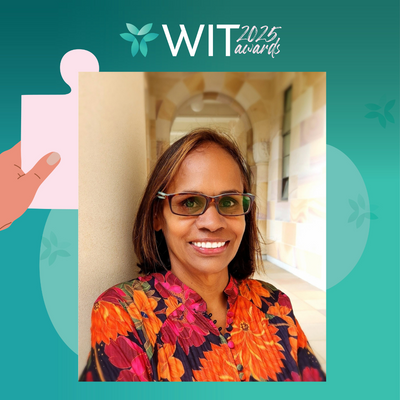
Rennae Hopkins
Rennae identifies as a strong proud Maiawali Karuwali Pitta Pitta woman of the Boulia area of Northwest Queensland. As the Indigenous Outreach Officer for the Faculty of Engineering, Architecture and Information Technology at a Queensland university, she supports Indigenous students and curricula matters in the EAIT faculty, but much more she is building relationships outside of the University with a number of Aboriginal and Torres Strait Islander communities and young people.
Her role includes outreach work to increase the number of Indigenous students in the faculty, and to also support them in a culturally safe space and inform and educate senior Faculty staff about how we achieve this in a culturally sensitive and appropriate manner.
As we are aware, Indigenous students are currently underrepresented in STEM fields at the tertiary level. By providing on campus experience days that incorporates Indigenous perspectives into hands-on engaging learning activities, we successfully build these relationships while at the same time preserving the oldest living culture in the world, in transmitting knowledge that develops a deeper understanding of scientific and engineering concepts that connects all Australians to Aboriginal and Torres Strait Islander culture and heritage.
Rennae is so honoured to do what she does and she feels grateful every day. She is taking this opportunity to inspire the next generation to become leaders in their community and increasing understanding and knowledge within her own faculty as such a privilege.
2025 Emerging Science Star Award - Winners
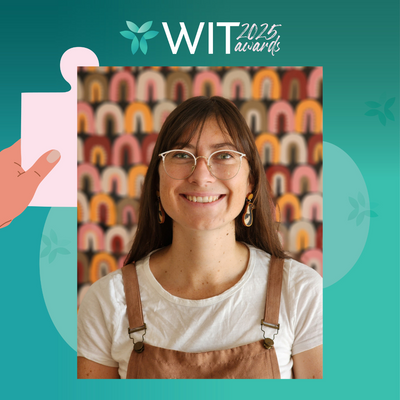
Alise Fox
Alise Fox is a stock assessment scientist, science communicator, artist, and gender and neurodivergence advocate working at the intersection of mathematics, marine science, and outreach. Her technical work involves conducting fishery stock assessments using complex modelling to determine how many fish are in the ocean, which is used to help manage wild fish populations sustainably. These assessments influence critical decisions affecting ecological, social, and economic outcomes in Australia’s seafood industry.
Alongside this, she co-leads the development of a national Communities of Practice for stock assessment science, streamlines reporting processes using R and automation, and contributes to transparent science through explainer videos and workshops. She works hard to make this highly technical field more accessible through creative science communication—developing games, interactive apps, art, and comedy performances that translate complex scientific ideas into engaging and inclusive experiences.
Her impact is broad and community-driven. In the past two years alone, she has reached over 3,000 people, mostly through volunteer initiatives. She has performed science stand-up comedy to hundreds, developed a board game to teach fishery dynamics to rural school students, and represented STEM professionals at events such as Vogue Codes and Science Meets Parliament. Her unique approach brings mathematical modelling to life, whether it’s in outback classrooms or comedy festivals.
Through this work, Alise champions alternative STEM career paths, highlighting that a successful, impactful STEM career can exist beyond academia, without a PhD, and with authenticity at the forefront.
2025 Raising the Regions Award - Winners
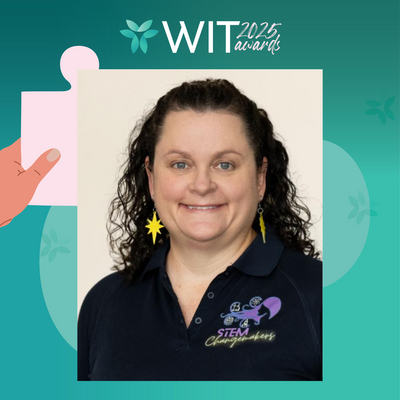
Sarah Chapman
STEM Changemakers is an innovative initiative designed to transform Australia’s ability to tackle complex STEM challenges. It achieves this by increasing both the number and diversity of participants in the STEM workforce – particularly through the targeted, integrated engagement of three key groups: underrepresented girls in regional areas, their families and educators, and local STEM professionals.
The program focuses on girls from diverse backgrounds, including those in low socioeconomic communities, Aboriginal and/or Torres Strait Islander backgrounds, and those who may lack family support. Over the course of two months, the program connects girls with local STEM industries to co-design solutions to real, place-based challenges currently facing their communities. These weekly half-day workshops are supported by relatable role models, hands-on learning, and long-term community engagement. At the same time, the program shifts the perceptions of family supporters by involving them directly, helping build broader encouragement and understanding of STEM pathways. STEM professionals also receive guidance and training, improving how they connect with and support young people from diverse backgrounds – learning how to communicate, inspire, and collaborate more effectively.
This integrated program design addresses three groups simultaneously, creating a strong, scalable model which has demonstrated impact which lasts after the formal program ends. In 17 months to May 2025 and after 1,700 engagements, 88% of program participants aspire to careers in STEM, coupled with a 96% increase in girls’ perception of engineering. Family supporters’ awareness of STEM pathways increased by 73%, and STEM Industry’s awareness of effective engagement increased by 77%.
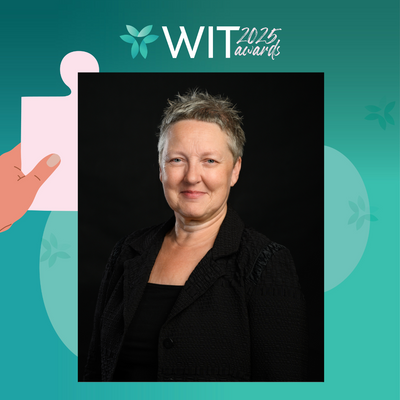
Professor Rowena Barrett
Professor Rowena Barrett is a distinguished academic leader and the current Pro Vice-Chancellor (Entrepreneurship and Regional Innovation) at QUT. With a career spanning three decades across Victoria, the UK, Western Australia and Queensland, her significant contributions are to entrepreneurship education, regional innovation, and the development of inclusive innovation ecosystems.
Her leadership is grounded in the belief that entrepreneurship is the pursuit of opportunity beyond the resources currently controlled, a philosophy that underpins her efforts to democratize innovation and empower communities to shape their futures. Bringing expertise in business, innovation and community, underpinned by scientific evidence, in recent years Rowena has:
– Created and led the QUT’s Entrepreneurship initiative, that encourage all forms of entrepreneurship across the QUT community.
– Embedded entrepreneurial thinking and mindset development such that QUT was named 2023-4 Asia-Pacific Entrepreneurial University of the Year.
– Developed and directed Queensland Connects, a leadership program for regional innovation ecosystems, which in 2025 has been licensed into WA as WA Connects.
– Served as inaugural Chair of the Queensland Innovation Advisory Council, working alongside two Chief Entrepreneurs to influence state-wide inclusive innovation policy and aligning it with the growth of emerging industries.
– Strengthened QUT’s partnership with the Bundaberg region, emphasising the region’s potential in agriculture, automation, and environmental management, noting that local businesses like Bundaberg Brewed Drinks are already leading with robotics and innovation.
Rowena leads with purpose and provides space for others to flourish, attributing success to community and youth engagement in context aware, place-based initiatives.
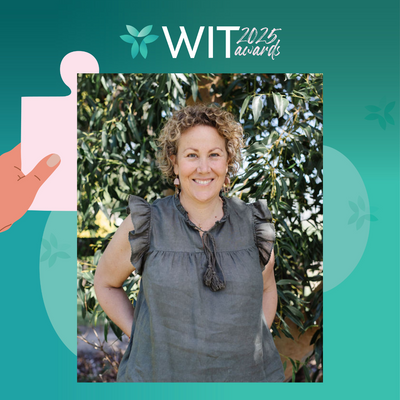
Julia Spicer - The Connection Table - Highly Commended
The Connection Table is a purpose-built platform and national facilitation practice designed to strengthen leadership, amplify advocacy, and accelerate impact across regional Australia. Operating at the intersection of community, industry, research and government, it exists to bring the right people together—with clarity, data, and direction—to tackle complex challenges and lead systemic change.
They support organisations and leaders to better understand their place in the system, identify leverage points, and collaborate with intention. Using a mix of strategic facilitation, network mapping, and insight-driven engagement processes, The Connection Table helps uncover shared priorities and turn conversations into coordinated action.
At its core, The Connection Table is about removing silos—between sectors, levels of government, and regions—so that ideas, funding, and leadership can flow where they’re needed most. We help local changemakers access national platforms, influence decision-making, and lead from wherever they are. It’s impact spans social, economic, and environmental domains. Socially, they build leadership capability and confidence—especially among women, regional entrepreneurs, and emerging voices. Economically, they support project design and partnerships that unlock investment and drive innovation. Environmentally, they foster collaborations that value place-based knowledge and long-term stewardship.
The Connection Table is not just a service—it is a movement to shift how we lead, advocate, and create solutions together. It’s leadership infrastructure for a more connected, resilient Australia.
2025 Public Sector Excellence Award - Winners
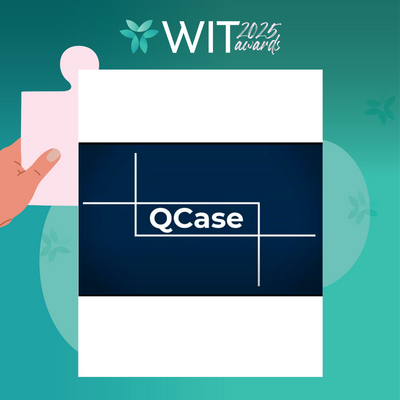
QCase Project and Transition Teams
QCase is a transformative digital platform revolutionising civil justice in Queensland. Developed for the Queensland Civil and Administrative Tribunal (QCAT) and Magistrates Courts, QCase enables end-to-end digital management of minor civil disputes, offering 24/7 access for individuals, legal professionals, and organisations to lodge documents, track progress, and view case information.
Technically, QCase integrates Microsoft Dynamics 365, DevOps pipelines, and Power Automate with legacy systems to provide secure data transactions, real-time updates, and automated workflows. It replaces a traditionally paper-based process, significantly reducing the volume of physical documents handled across the court system.
QCase has improved case processing times by enabling faster information access and more efficient case tracking. The system delivers accurate, real-time reporting, increasing transparency of workloads across different court locations and allowing judicial and registry staff to locate documents and monitor case statuses regardless of geographic boundaries.
Automated correspondence features streamline communication by generating timely notifications to applicants and relevant parties, enhancing service delivery and reducing delays. Additionally, the guided digital experience simplifies court interactions for self-represented litigants, improving accessibility and user confidence.
Professionally, QCase represents a landmark in public sector digital transformation, delivered through collaborative leadership, rigorous testing, and effective change management. Its success lies not just in its technical execution, but in the inclusive, user-centred design that prioritises access to justice for all Queenslanders.
QCase sets a bold new benchmark for court innovation, combining technology and teamwork to deliver lasting impact.
2025 Lifting Communities Award - Winners
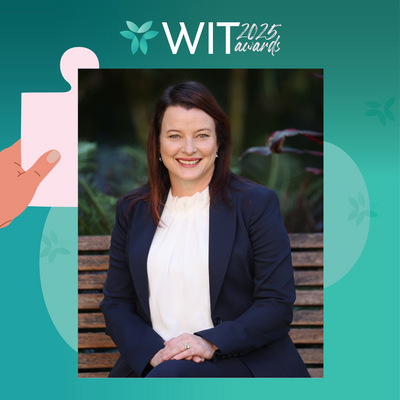
Dr Catherine Franklin
Dr Franklin is a psychiatrist and has devoted her 20 year career to improving the health and mental health of people with intellectual disability and autistic people. Her work encompasses clinical care, service innovation, education and applied research with over $10M secured in competitive funding in the last 5 years. She also advocates for this community through media and systemic advocacy. Serving as the Director of the newly established Queensland Centre of Excellence in Intellectual Disability and Autism Health at Mater Hospital Brisbane, her unique statewide clinical service and research centre is dedicated to enhancing health outcomes for adolescents and adults with intellectual disability or autism.
In 2022, she campaigned to the Queensland Government for improved services and following this, an $18M annual investment was announced to establish the Queensland centre and 12 new IDD mental health teams. Subsequently, she successfully led the competitive tender application that established the Queensland Centre of Excellence in Intellectual and Developmental Disability Mental Health—a groundbreaking Australian first. This Centre, which she now directs, collaborates with 12 statewide mental health teams to bring specialist support to rural and remote areas, advancing health equity across Queensland. with over $10M secured in competitive funding.
The co-designed EASY-Health project is one of her innovations, which introduced Australia’s first online education for mainstream clinicians, featuring actors with disabilities. Now available across Queensland Health and mandated nationally across Medicare Urgent Care Clinics, this dedication has reshaped clinician perspectives and significantly improved equitable access to care.
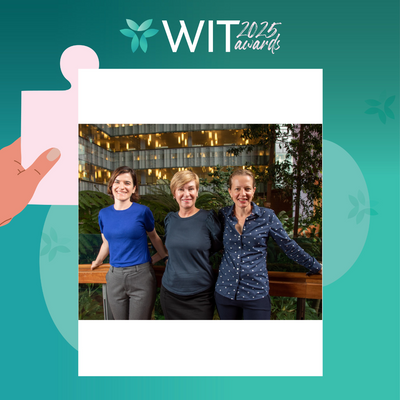
SPARQ-ed Students Performing Advanced Research QLD - Highly Commended
Biomedical educational program SPARQ-ed is opening the doors to science and research for high school students from across Queensland.
The team has engaged with more than 10,000 high school students since 2020 to inspire them to consider STEM subjects and careers. Implementing strategies that promote engagement for all Queenslanders has been a priority. Strategies aim to remove barriers for access for students from disadvantaged communities, regional and remote Queensland and from groups traditionally underrepresented in STEM.
The program’s team is jointly staffed by the Translational Research Institute (TRI) and the Department of Education. They are based at TRI in Brisbane and collaborate with researchers from The University of Queensland, Queensland University of Technology, Mater Research Institute and Queensland Health to develop programs inspired by current practise and foster curiosity in participants. An active Alumni network provides students with ongoing opportunities to engage with TRI and its partners, fostering continued learning and shared passion.
They also travel around Queensland delivering hands-on workshops, building strong connections with regional, rural and Indigenous communities. They work with the Lions Medical Research Foundation to reduce the financial burden on families to access the programs.
Student and family testimonials demonstrate that the SPARQ-ed, TRI based researchers and LMRF collaboration is making a major difference to rural and regional students – and by extension, their communities.
SPARQ-ed activities are igniting curiosity, broadening horizons and providing context for classroom studies.
2025 Future Focused Business Achiever Award - Winners
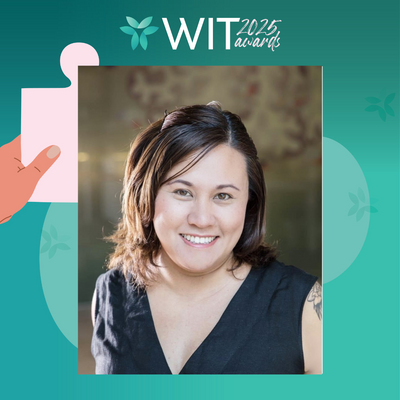
Clarissa Yates - Ketim Technologies
Ketim Technologies, is building the world’s first integrated blood biomarker platform to predict, diagnose, and treat postpartum depression (PPD) and related neuropsychiatric conditions. Using ethically sourced biobank cohorts and clinically validated plasma samples, it has identified a panel of novel protein biomarkers capable of stratifying women at risk of PPD as early as mid-pregnancy. This platform is designed to deliver both a predictive diagnostic test and identify therapeutic targets to support personalised treatment strategies.
Their work delivers impact across scientific, social, and economic dimensions. Scientifically, they are addressing a critical gap in mental health diagnostics by developing the first objective, blood-based screening tool for early detection of PPD. Socially, they empower women, families, and clinicians with timely, data-driven insights to support early intervention and reduce stigma. Economically, their innovation targets a significant health system burden—perinatal mental illness costs Australia more than \$877 million annually and remains a leading cause of maternal morbidity and mortality.
As a female-founded company, Ketim Technologies embodies the values of advancement, connection, and empowerment. They connect perinatal researchers, clinicians, and end users to shift the paradigm in maternal mental health care—from reactive to preventive. Driven by lived experience and scientific rigour, they are reimagining how biotechnology can create a measurable, meaningful difference in women’s lives.
2025 Excellence in Research Award - Winners
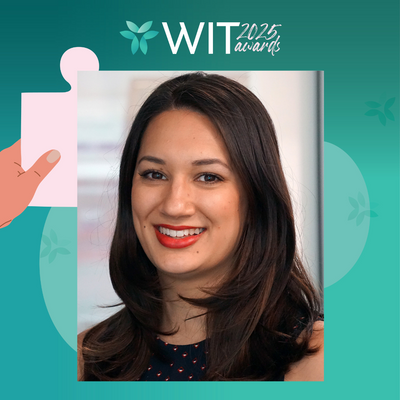
Dr Jacqui McGovern
I lead pioneering research into childhood bone cancers, designing smarter, personalised treatments that preserve lives and limbs. My research program focuses on cancers that interact with bone, with a particular emphasis on osteosarcoma, the most common primary bone cancer in children and adolescents. My goal is to improve clinical outcomes and quality of life for patients with bone tumours through innovative research that combines cancer biology, advanced biomaterials, and tissue engineering.
My research centres on three key pillars:
1. Personalised Medicine – We grow patient-specific tumour organoids in the lab to test and predict individual chemotherapy responses.
2. Targeted Chemotherapy Delivery – We develop biodegradable implants that deliver chemotherapy directly to tumour sites while limiting systemic toxicity.
3. Bone Regeneration – We apply regenerative medicine techniques to stimulate bone regrowth following tumour resection, aiming to avoid prosthetics or amputation and restore proper limb functioning.
This integrated approach provides a new way to study tumour–bone interactions and test therapies in highly relevant preclinical models. My team collaborates closely with clinicians and industry to ensure our work has real translational impact.
Our models are being used to refine chemotherapy regimens, screen new drugs, and develop next-generation biomaterials. These efforts are contributing to faster, more cost-effective therapy development, with the goal to reduce clinical trial failure rates, and develop more personalised treatment pathways for patients. Ultimately my goal is to create survivable futures for young people with bone cancer by making personalised, regenerative therapies the new standard of care.
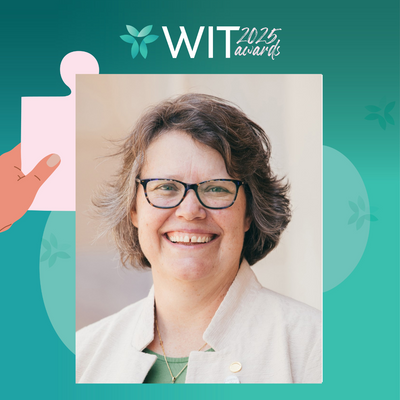
Professor Christine Anne Beveridge
Professor Christine Beveridge is internationally recognised for her groundbreaking contributions to plant developmental biology, particularly in understanding shoot branching—an essential trait underpinning crop yield, resilience, and productivity across agriculture, forestry, and horticulture. Her discovery of strigolactones as a new class of plant hormones was a transformative moment in the field, unlocking new understanding of how plants regulate nutrient uptake, root and shoot growth, weed competition, and environmental stress.
Her pioneering work has led to a fundamental shift in how the scientific community understands plant hormone interactions. She redefined the role of auxin in pruning, elevated the importance of photosynthates, and developed the most complete model of shoot branching control to date. These insights have been widely adopted by breeders in global agriculture, helping drive gains in yield and efficiency.
Professor Beveridge’s influence reaches far beyond the lab bench. A champion for collaboration and inclusion, she leads a cross-disciplinary team of biologists, geneticists, and mathematicians to translate complex network biology into practical tools for plant breeding—bridging the gap between discovery and real-world impact. Her current work aims to integrate gene-environment interactions into breeding pipelines, attracting investment from leading multinational companies.
Across her career, Christine has consistently lifted others as she climbed—mentoring countless early and mid-career researchers, particularly women, and creating opportunities for diverse voices in science. She embodies the values of equity, excellence, and enduring impact, leaving a legacy not only of scientific achievement, but of a research culture that is more inclusive, supportive, and future-focused.
2025 Excellence in Industry Leadership Award - Winners
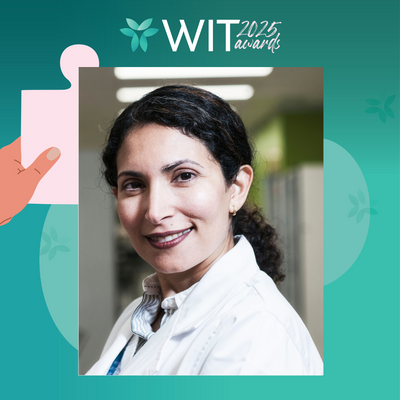
Dr Lalehvash Moghaddam
As a Senior Polymer and Industrial Chemist and Program Leader in Bioresources, Bioprocessing and Biorefining at QUT’s Centre for Agriculture and the Bioeconomy, Lalehvash leads industry-focused research to accelerate the transition from fossil-based to bio-based economies. With over 15 years’ experience developing technologies that turn agricultural biomass into renewable fuels, chemicals, and materials, Lalehvash brings deep expertise to this field. Lalehvash’s journey began in petrochemistry, studying polymer science and degradation. Today, Lalehvash applies that expertise to lead a team creating high-performance, sustainable alternatives to fossil-derived products.
At the core of Lalehvash’s work is hydrothermal liquefaction (HTL), a cutting-edge process that mimics fossil fuel formation in hours, not millennia. HTL converts wet biomass into bio-crude oil using moderate temperatures and high pressures, eliminating the need for energy-intensive drying. Lalehvash platform is flexible for yield, cost, or performance, and scalable from lab to pilot.
Through international partnerships, such as the Queensland-Germany project, Lalehvash collaborates with industry to transform agricultural waste into bio-based foams for the automotive and outdoor sectors, delivering products that match or exceed petrochemical benchmarks.
Lalehvash’s work supports Queensland and Australia’s bioeconomy strategies by decarbonizing critical sectors, attracting global investment, and creating regional jobs. Lalehvash has published extensively with 77 articles in leading journals in the field, and works with commercial partners including Licella (Australia), Grammar (Germany), Vaudi (Germany), and both national and international experts to translate innovations into market-ready solutions.
By combining Queensland’s rich biomass resources with cutting-edge science, she is helping build a circular, climate-resilient economy, delivering environmental, social, and economic impact.
2025 Employer of Change Award - Winners
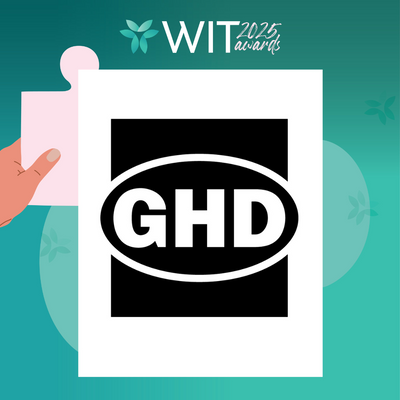
GHD (Jane Dermody)
At GHD, we believe that a career break should not mean a career end. That’s why we created the Relaunch Your Career Program; a 10-week, paid, flexible program designed to support professionals, particularly women in STEM, as they re-enter the workforce with confidence and purpose.
Launched in 2017, this national program, offered annually, has provided over 170 participants with real project experience, and a strong support network of mentors, buddies, and peers. 80% of program participants have been women with 81% of program graduates offered long-term employment following the program.
The Relaunch Your Career Program is more than a return-to-work initiative, it’s designed to initiate long-term success. Following the program, many participants transition into permanent roles and leadership pathways and become advocates and mentors for future cohorts.
What sets this program apart is its human-centred design. We meet Career Relaunchers where they are, offering flexible hours, hybrid work options, and a culture that values lived experience. Participants are assigned to high-impact projects aligned with their skills, ensuring them the opportunity to contribute to meaningfully work and goals from day one.
The program is taking a step towards a more inclusive future – one where we challenge outdated norms, celebrate diverse journeys, and build a stronger, more resilient workforce. At GHD, we don’t just welcome Career Relaunchers, we set them up for lasting success.
2025 Emerging Tech Star Award - Winners
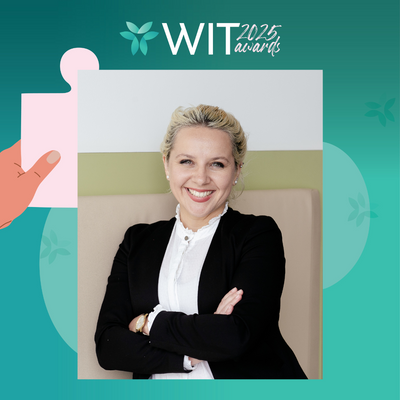
Dr Aida Branković
Dr Aida Branković is a purpose-driven researcher and engineer at the cutting edge of biomedical innovation, leading work at the intersection of AI and healthcare. Her mission is to develop innovative, safe, ethical, and trustworthy AI-enabled clinical decision support tools and medical devices that improve healthcare delivery and patient outcomes. She led the development of AI-based algorithms planned for deployment across 27 major public hospitals in Queensland, including predictive models for early warning systems in acute care and engagement in digital health programs, which enhance patient support, outcomes, and reduce costs. These solutions attracted interest from global health-tech leaders like InterSystems and Telstra, showcasing strong impact and innovation.
During her postdoc at the University of Queensland, in collaboration with the Australian start-up EMvision Medical Devices, Dr Branković invented two stroke localisation AI algorithms for a ground-breaking brain scanner—the first ultra-light, non-ionising, portable device for rapid pre-hospital stroke diagnosis. EMVision has become a global leader in stroke diagnostics, now valued at $150M. The technology’s socio-economic potential led to a five-year agreement with the Australian Stroke Alliance and $8M in funding for further development.
Beyond algorithms, she led an interdisciplinary team to develop a world-first provisional tool for assessing explainable AI—AI that can clearly communicate how and why it made a decision—addressing critical issues of transparency, fairness, and trust in AI. Guided by social impact, Dr Branković is committed to advancing STEM through ethical AI healthcare innovations. Her research has attracted leading industry partners, earned funding, and demonstrated scientific excellence and real-world impact.
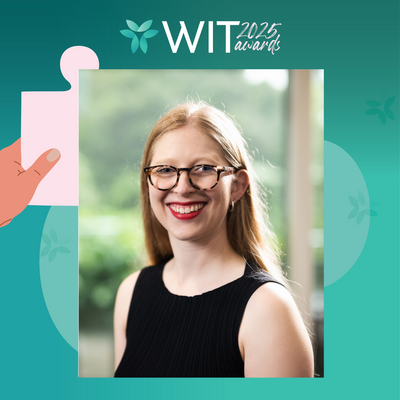
Dr Scarlett Raine - Highly Commended
Dr Scarlett Raine is a Research Fellow and incoming Lecturer (commencing August 2025) in the QUT Centre for Robotics, Australia’s top-ranked robotics group for six years running (The Australian Magazine). Her pioneering work combines AI and robotics with marine conservation – specifically, she designs computer vision algorithms to monitor underwater environments at scale, while minimizing costly and time-consuming expert input.
She then translates these complex AI techniques into real-world applications to automate species identification in underwater images. This enables monitoring at unprecedented scales – analyzing terabytes of imagery across entire reef systems, which would be infeasible with manual methods.
Dr Raine’s research has led to significant environmental impact – she created the first multi-species seagrass meadow monitoring approach and developed the DeepSeagrass dataset, making it possible to track these vital and overlooked ecosystems at scale. Another recent example, in collaboration with the Australian Institute of Marine Science, is her AI-driven approach to automated targeted reseeding of temperature-resilient baby corals across the Great Barrier Reef. Her algorithms automatically identify the best locations to place baby corals, supporting Australia’s ambitious goal of deploying three million coral larvae devices in the coming years.
She also highlights the economic impact of her AI approaches: they free up marine scientists by reducing the time and cost of underwater image analysis by up to 60-fold, while also making the analysis more accessible to resource-constrained conservation groups. Dr Raine’s work represents a crucial breakthrough in the emerging technology landscape as well as in the fight to protect marine environments, offering hope for reefs worldwide.

